Question
Which of the following two persons visit Mumbai?
Study the below details and answer the following questions. Eight persons – A, B, C, D, E, F, G and H are going to four destinations viz., Delhi, Bangalore, Mumbai and Kolkata and they represent four different departments viz., Human Resources, Sales, Finance and Marketing but not necessarily in the same order. At least two persons belong to the same department and two of them visit the same destination. A belongs to the Finance department and he visits the same city as that of G. G doesn’t belong to the Finance, Marketing or Human Resources department. G doesn’t visit Kolkata or Mumbai. C visits Delhi and belongs to Human Resources department. The person who belongs to the Finance department other than A visits Delhi. B and G belongs to the same department. F visits Mumbai and he, doesn’t belongs to Sales and Marketing department. The two persons who belong to Marketing department visit Kolkata. D doesn’t belong to the Marketing department.Solution
A belongs to the Finance department and he visits the same city as that of G. G doesn’t visit Kolkata or Mumbai. So, he visits either Delhi or Bangalore. 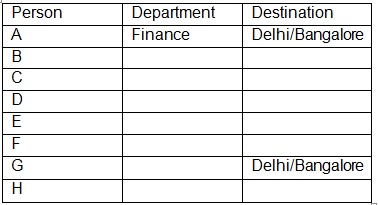 G doesn’t belong to the Finance, Marketing or Human Resources department. So, he belongs to Sales department.
G doesn’t belong to the Finance, Marketing or Human Resources department. So, he belongs to Sales department. 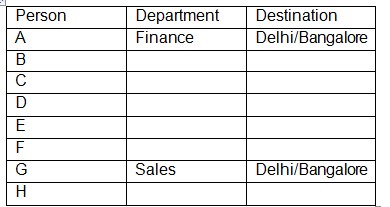 C visits Delhi and belongs to Human Resource department. Given, two persons visit same destination. So, A and G should travel to Bangalore.
C visits Delhi and belongs to Human Resource department. Given, two persons visit same destination. So, A and G should travel to Bangalore. 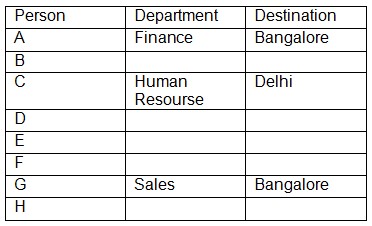 B and G belongs to the same department. So, B belongs to Sales department.
B and G belongs to the same department. So, B belongs to Sales department. 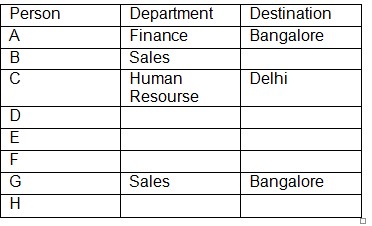 F visits Mumbai and he doesn’t belongs to Sales and Marketing department. So, he belongs to either Human Resources or Finance.
F visits Mumbai and he doesn’t belongs to Sales and Marketing department. So, he belongs to either Human Resources or Finance. 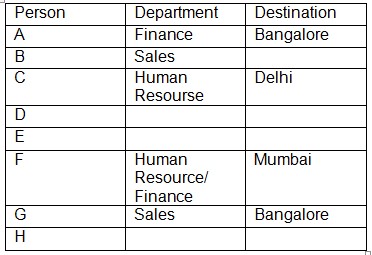 The two persons who belong to Marketing department visit Kolkata. D doesn’t belong to the Marketing department. Therefore, E and H belong to Marketing department and visit Kolkata.
The two persons who belong to Marketing department visit Kolkata. D doesn’t belong to the Marketing department. Therefore, E and H belong to Marketing department and visit Kolkata. 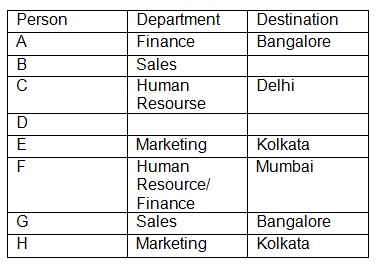 The person who belongs to the Finance department other than A visits Delhi. So, F belongs Human Resources. Therefore, D belongs to Finance and visits Delhi. B travel to Mumbai. The final arrangement will be as shown:
The person who belongs to the Finance department other than A visits Delhi. So, F belongs Human Resources. Therefore, D belongs to Finance and visits Delhi. B travel to Mumbai. The final arrangement will be as shown: 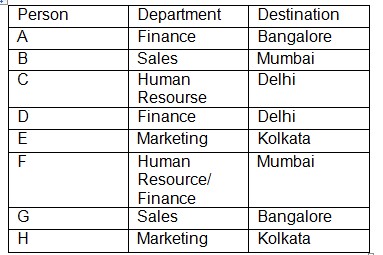
What should come in place of (?) question mark in the following number series.
256, 128, 64, 32, 16, ?
5, 18, 39, ?, 105, 150
Find the missing number in the given number series.
2, 5, 11, 23, 47, ?What value should come in the place of (?) in the following number series?
?, 664, 706, 769, 853, 9584, 9, 24, 69, ?, 609
What will come in place of (?) Question mark in the given number series.
1, 2, 5, 14, 41, 122, ?
600 60 12 ? 1.44 0.72
36, 48, 24, 60, ?, 72
38% of 18/225 of 31/19 of 15225 =?
580 557 528 497 ? 419
Relevant for Exams:



